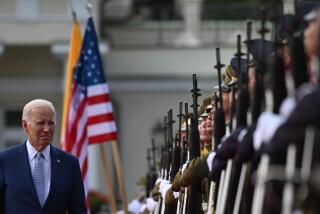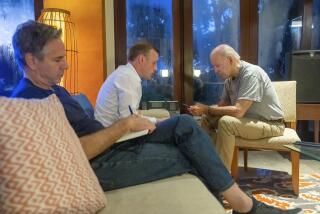Bush Exults in ‘Double-Hit’ Success as NATO Talks End : He Calls Arms Plan ‘a Victory’
BONN — President Bush exulted today over what he called the “double-hit” success of a NATO summit that produced a united Western front on both conventional and nuclear weapons and smoothed over a dispute with West Germany in the process.
Bush flew to Bonn from Brussels, where the 16-nation North Atlantic Treaty Organization had just forged a compromise on short-range nuclear missiles. The deal will keep some of the NATO weapons deployed indefinitely while providing a framework for eventual negotiations with the Soviets to reduce the stockpiles once conventional weapons in Europe are cut.
Bush met one-on-one in Bonn with West German Chancellor Helmut Kohl, who called the President “a friend among friends.” Bush said he was “very pleased with the reaction to the NATO decision.”
Triumphant Mood
In a triumphant mood, Bush said the alliance had scored a “double hit” with its decision on the nuclear issue and its endorsement of his proposal for widespread reductions in troops and conventional weapons based in Europe.
The communique winding up the 40th anniversary summit meeting specified that only a “partial reduction” in battlefield nuclear weapons would be pursued.
That was a setback for Kohl, who had sought swift U.S.-Soviet negotiations with the possible aim of eliminating short-range nuclear missiles both in NATO and the Warsaw Pact.
“There will be no third zero,” Bush said in a reference to arms control jargon for scrapping the missiles. “Partial means partial.”
The two other “zeroes” were in the 1987 U.S.-Soviet treaty banning two categories of intermediate-range missiles.
West Germany’s Gains
But despite the tilt toward the U.S. position, Kohl did not leave the summit empty-handed. On a related issue, Bush and British Prime Minister Margaret Thatcher agreed to postpone modernization of the U.S.-built Lance launchers that are deployed mostly in West Germany.
Bush, discussing the compromise at a news conference, said: “I don’t view it as a victory for the United States. I view it as a victory for the alliance.”
Bush and Thatcher had wanted to more than triple the range of the Lances, but at West Germany’s urging the allies decided to postpone any modernization until 1992. At that point, the communique said, “the introduction and deployment of a follow-on system for the Lance will be dealt with . . . in the light of overall security developments.”
‘Package Deal’
At a news conference later today, Secretary of State James A. Baker III cautioned the Soviet Union that the NATO proposals were a “package deal.”
“This is not something we have put on the table, the idea that the East can come in and pick what they like and leave what they don’t like.”
The NATO leaders also gave a green light to the U.S. Congress to finance the development of a more powerful short-range missile in the meantime.
Kohl, under intense disarmament pressure at home, praised the United States for breaking the impasse over when and whether to negotiate cuts in the short-range nuclear weapons.
“I now see a historic chance for realistic and significant arms control progress,” Kohl said. “We are ready to make use of this chance.”
More to Read
Get the L.A. Times Politics newsletter
Deeply reported insights into legislation, politics and policy from Sacramento, Washington and beyond. In your inbox three times per week.
You may occasionally receive promotional content from the Los Angeles Times.










